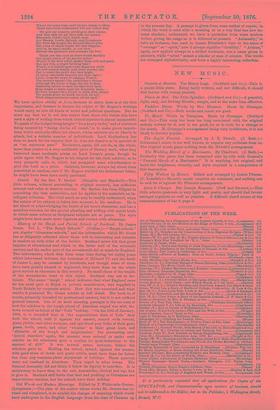_History of the Burgh and Parish "Schools of Scotland. By
James Grant. Vol. L, "The Burgh Schools." (Collins.)—" Burgh-schools" are Anglice "Grammar-schools," and the information which Mr. Grant has so diligently collected about them will be interesting and valuable to readers on both aides of the border. Scotland never felt that great impulse of educational zeal which in the latter half of the sixteenth century and the earlier part of the seventeenth did so much for England. The endowments, which date from some time during the eighty years which intervened between the accession of Edward VI. and the death of James L, may be counted by hundreds, and though some of them have been greatly abused or neglected, they have done on the whole good service to education in this country. No small share of the wealth of the monasteries went to this object. Scotland was not so for- tunate. The name " burgh " school indicates that what England owes for the most part to Royal or private munificence, was supplied in North Britain by corporate action. How this was exercised and what results it produced Mr. Grant relates in full detail. His book is, of course, primarily intended for professional readers, but it is not without general interest. One of its most amusing passages is the account of how the scholars in the burgh school of Aberdeen waged war with the town council on behalf of the Yule "holiday. "On the 10th of January, 1604, it is recorded that at 'the superstitious time of Yule' they took the school, held it against the master, armed with swords, guns, pistols, and other weapons, and spiritised poor folks of their gear, geese, fowls, peats, and other vivaries ' to their great hurt, and sklander of the burgh and magistraties.' For preventing such horrid disorders' again, the masters were ordered to make each scholar on his admission give a caution for good-behaviour to the amount of .£10." It was several years, however, before the icholars gave in. Holding the school, indeed, against the master, with good store of fowls and poets within, must have been far better fun than any common-place enjoyment of holidays. These quarrels were not confined to Aberdeen. They raged in other towns. The General Assembly did not think it below its dignity to interfere. It is satisfactory to know that, in the end, Assemblies, clerical and lay, had to give in. Scotland still holds that beef and padding at Christmas are superstitions vanities, but the schools have their holiday.


































 Previous page
Previous page